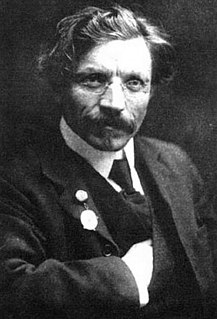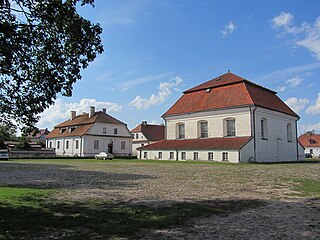Tevye the Dairyman is the fictional narrator and protagonist of a series of short stories by Solomon Naumovich Rabinovich, originally written in Yiddish, and first published in 1894. The character is best known from the fictional memoir Tevye and His Daughters as a pious Jewish milkman in Tsarist Russia with six troublesome daughters: Tzeitel, Hodel, Chava, Shprintze, Beilke, and Teibel. He is also known from the musical dramatic adaptation of Tevye and His Daughters, Fiddler on the Roof. The Village of Boyberik, where the stories are set, is based on the town of Boyarka in Ukraine.
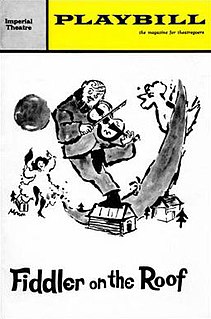
Fiddler on the Roof is a musical with music by Jerry Bock, lyrics by Sheldon Harnick, and book by Joseph Stein, set in the Pale of Settlement of Imperial Russia in 1905. It is based on Tevye and his Daughters and other tales by Sholem Aleichem. The story centers on Tevye, the father of five daughters, and his attempts to maintain his Jewish religious and cultural traditions as outside influences encroach upon the family's lives. He must cope both with the strong-willed actions of his three older daughters, who wish to marry for love – each one's choice of a husband moves further away from the customs of their Jewish faith and heritage – and with the edict of the Tsar that evicts the Jews from their village.

Mendele Mocher Sforim, born Sholem Yankev Abramovich or S. J. Abramowitch, was a Jewish author and one of the founders of modern Yiddish and Hebrew literature.
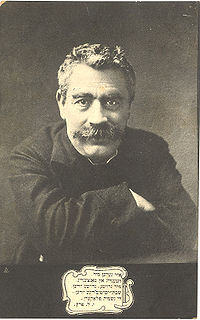
Isaac Leib Peretz, also sometimes written Yitskhok Leybush Peretz, best known as I. L. Peretz, was a Yiddish language author and playwright from Poland. Payson R. Stevens, Charles M. Levine, and Sol Steinmetz count him with Mendele Mokher Seforim and Sholem Aleichem as one of the three great classical Yiddish writers. Sol Liptzin wrote: "Yitzkhok Leibush Peretz was the great awakener of Yiddish-speaking Jewry, and Sholom Aleichem its comforter... Peretz aroused in his readers the will for self-emancipation, the will for resistance..."
Yankev Shternberg was a Yiddish theater director, teacher of theater, playwright, avant-garde poet and short-story writer, best known for his theater work in Romania between the two world wars.
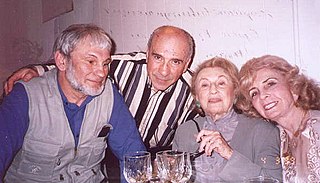
Bella "Bel" Kaufman was an American teacher and author, well known for writing the bestselling 1964 novel Up the Down Staircase.

Tevya is a 1939 American Yiddish film, based on author Sholem Aleichem's stock character Tevye the Dairyman, also the subject of the 1964 musical Fiddler on the Roof. It was the first non-English language picture selected for preservation by the National Film Registry.

Sholem Aleichem Amur State University, formerly Birobidzhan State Pedagogical Institute, is a university in Russia. This is the only university based in the Jewish Autonomous Oblast. It is named after Jewish-Russian author Sholem Aleichem.

Filmworks XX: Sholem Aleichem features a score for film by John Zorn. The album was released on Zorn's own label, Tzadik Records, in 2008 and contains music that Zorn wrote and recorded for a documentary on the 19th century Jewish writer Sholem Aleichem.
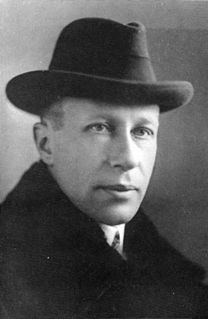
Vladimir Davidovich Medem, né Grinberg, was a Russian Jewish politician and ideologue of the Jewish Labour Bund. The Medem library in Paris, the largest European Yiddish institution, bears his name.
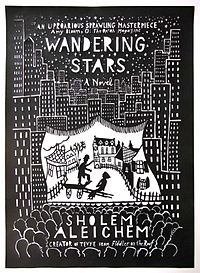
Wandering Stars is a novel by Sholem Aleichem, serialized in Warsaw newspapers from 1909 to 1911. In it, Leibel, the son of a wealthy shtetl family, falls in love with cantor's daughter Reizel, and both fall for a traveling Yiddish theatre group. Separating and becoming successful performers in the West, under the names of Leo Rafalesco and Rosa Spivak, they eventually find each other again in America.

The Yiddish Art Theatre was a New York Yiddish theatre company of the 20th century.
Ken Frieden is the B.G. Rudolph Professor of Judaic Studies— and a full professor in the Departments of English, Languages, Literatures, and Linguistics, and Religion — at Syracuse University. He writes about, edits, and promotes Hebrew, Yiddish, and other Jewish literature.
Mazel-tov, is a one-act Yiddish-language play by Sholem Aleichem. The play focuses on the relationship between the servants downstairs, the cook Beyle, and the upstairs rich, the Landlord. One memorable servant song from the 1889 play "Bitter is the food That gets burnt, Bitter is it to work Beyond your strength", was later recycled and included into the 1949 and 1969 Polish Jewish State Theatre production of The Treasure in the mouth of another servant, Zelda. The play was revived after the Revolution among the repertoire of the Moscow Yiddish Chamber Theater (GOSET) in the 1920s. It was set as an opera Congratulations! by Mieczysław Weinberg in 1975.
Green Violinist is a 1923-24 painting by artist Marc Chagall that is now in the permanent collection of the Solomon R. Guggenheim Museum in New York City. The work depicts a fiddler as the central figure who appears to be floating or dancing above the much smaller rooftops of the misty gray village below. This work is often considered to be the inspiration for the title of the 1964 musical Fiddler on the Roof.

Broken BarriersakaKhava חוה n is a 1919 American Yiddish film, based on author Sholem Aleichem's stock character טבֿיה דער מילכיקער Tevye der milkhiker.

Sholem Aleichem College is an Independent Jewish co-educational early learning and primary day school located in the Melbourne suburb of Elsternwick, Victoria, Australia. Established in 1947, the school caters to the religious and general education needs of approximately 300 students, ranging from early learning, to Kindergarten and through to Year 6.
YechezkelKotik was a Yiddish author.
